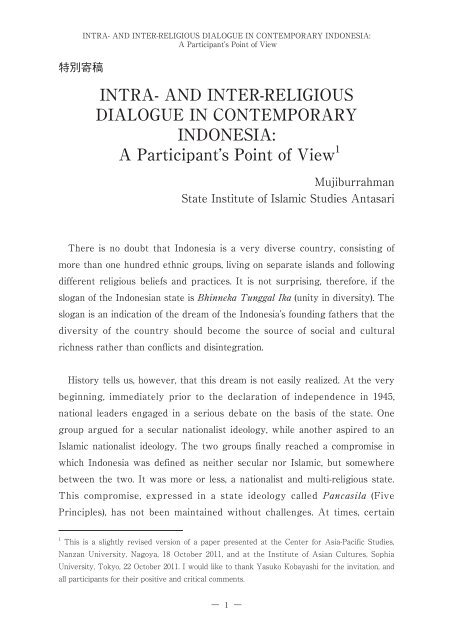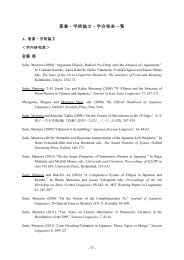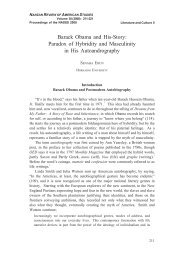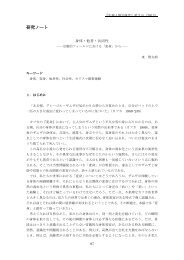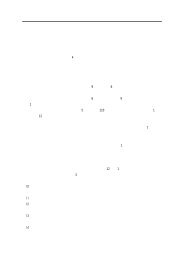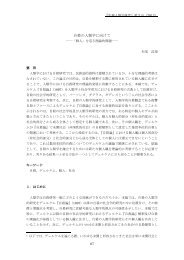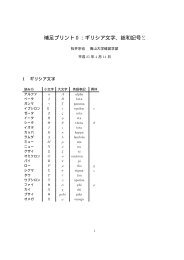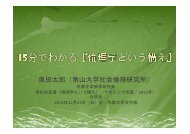INTRA- AND INTER-RELIGIOUS DIALOGUE IN ... - 南山大学
INTRA- AND INTER-RELIGIOUS DIALOGUE IN ... - 南山大学
INTRA- AND INTER-RELIGIOUS DIALOGUE IN ... - 南山大学
You also want an ePaper? Increase the reach of your titles
YUMPU automatically turns print PDFs into web optimized ePapers that Google loves.
<strong><strong>IN</strong>TRA</strong>- <strong>AND</strong> <strong><strong>IN</strong>TER</strong>-<strong>RELIGIOUS</strong> <strong>DIALOGUE</strong> <strong>IN</strong> CONTEMPORARY <strong>IN</strong>DONESIA:<br />
A Participant’s Point of View<br />
特 別 寄 稿<br />
<strong><strong>IN</strong>TRA</strong>- <strong>AND</strong> <strong><strong>IN</strong>TER</strong>-<strong>RELIGIOUS</strong><br />
<strong>DIALOGUE</strong> <strong>IN</strong> CONTEMPORARY<br />
<strong>IN</strong>DONESIA:<br />
A Participant’s Point of View 1<br />
Mujiburrahman<br />
State Institute of Islamic Studies Antasari<br />
There is no doubt that Indonesia is a very diverse country, consisting of<br />
more than one hundred ethnic groups, living on separate islands and following<br />
different religious beliefs and practices. It is not surprising, therefore, if the<br />
slogan of the Indonesian state is Bhinneka Tunggal Ika (unity in diversity). The<br />
slogan is an indication of the dream of the Indonesia’s founding fathers that the<br />
diversity of the country should become the source of social and cultural<br />
richness rather than conflicts and disintegration.<br />
History tells us, however, that this dream is not easily realized. At the very<br />
beginning, immediately prior to the declaration of independence in 1945,<br />
national leaders engaged in a serious debate on the basis of the state. One<br />
group argued for a secular nationalist ideology, while another aspired to an<br />
Islamic nationalist ideology. The two groups finally reached a compromise in<br />
which Indonesia was defined as neither secular nor Islamic, but somewhere<br />
between the two. It was more or less, a nationalist and multi-religious state.<br />
This compromise, expressed in a state ideology called Pancasila (Five<br />
Principles), has not been maintained without challenges. At times, certain<br />
1<br />
This is a slightly revised version of a paper presented at the Center for Asia-Pacific Studies,<br />
Nanzan University, Nagoya, 18 October 2011, and at the Institute of Asian Cultures, Sophia<br />
University, Tokyo, 22 October 2011. I would like to thank Yasuko Kobayashi for the invitation, and<br />
all participants for their positive and critical comments.<br />
―<br />
1<br />
―
南 山 大 学 アジア・ 太 平 洋 研 究 センター 報<br />
第 7 号<br />
Islamic groups tried to change the state ideology into an Islamic ideology,<br />
while at some other times, secular oriented groups also tried to impose secular<br />
interpretations of Pancasila, and pushed for state policies which marginalise<br />
the Islamic groups. However, today Pancasila is still the common platform for<br />
the highly plural Indonesia.<br />
Of course, ideology is not the only important political issue in the country.<br />
There are other important problems like social and economic gaps between<br />
the rich and the poor, between the densely populated Java island and the outer<br />
islands, between the Javanese, the largest and dominant ethnic group, and the<br />
other ethnic groups, between indigenous and migrant ethnic groups, and last<br />
but not least, between a religious majority and religious minorities. These<br />
issues are sometimes more important than that of ideology, but they could be<br />
expressed in ideological terms. Rebellious movements in the late 1950s like<br />
Darul Islam and PRRI, could not simply be understood as ideological struggles.<br />
Social and economic gaps certainly contributed to the rise of the rebellions. On<br />
the other hand, without neglecting the politico-economic basis of the conflicts<br />
in Ambon and Poso during the last days of Soeharto and the early years of the<br />
Reformation Era (Klinken 2007 and Wilson 2010), the issue of religion and even<br />
nationalism (especially in Ambon where the Christians have been stigmatised<br />
as supporters of the rebellious RMS movement) still politically matters. The<br />
ideological issue has been even more openly expressed during the Reformation<br />
Era by Islamic political parties like PPP, PKS and PBB, as well as by Islamic<br />
organizations such as Hizbut Tahrir Indonesia, Majelis Mujahidin and Ansharut<br />
Tauhid. The issuing of the regional shari’a regulations in certain provinces of<br />
the country is also obviously ideological (Bush 2008; Mujiburrahman 2009).<br />
Thus, the problems faced by the Indonesian government and society to<br />
maintain national unity are quite complicated. Various attempts have been<br />
taken by the government and civil society to maintain social harmony accross<br />
the country, and one such endeavor is to encourage intra- and inter-religious<br />
dialogue. In this paper, I would like to discuss the development of intra- and<br />
―<br />
2<br />
―
<strong><strong>IN</strong>TRA</strong>- <strong>AND</strong> <strong><strong>IN</strong>TER</strong>-<strong>RELIGIOUS</strong> <strong>DIALOGUE</strong> <strong>IN</strong> CONTEMPORARY <strong>IN</strong>DONESIA:<br />
A Participant’s Point of View<br />
inter-religious dialogue in Indonesia, based on my personal observations and<br />
experiences as a participant in dialogues on various occassions and places in<br />
Indonesia, especially during the last decade.<br />
An Historical Overview of Dialogue in Indonesia 2<br />
Dialogue as a programmed meeting of religious believers to attain mutual<br />
understanding and cooperation is apparently not an activity with a long<br />
history. In fact, it was initially proposed during the second half of the twentieth<br />
century by Christian religious leaders, but received positive responses from<br />
leaders of other religions. The dialogue program in Indonesia was started by<br />
the 1960s, and such dialogues have been subsequently initiated by the<br />
government as well as private organizations. Those dialogues were organised<br />
to achieve one or more of the following ends, ⑴ to end recent conflicts; ⑵ to<br />
support government programs; ⑶ to find common grounds related to religious<br />
differences; and ⑷ to establish mutual understanding and cooperation between<br />
different religious groups.<br />
Abdul Mukti Ali, a McGill University graduate interested in the academic<br />
study of comparative religion, is generally recognised as the father of interreligious<br />
dialogue in Indonesia. He organised inter-religious dilogue in his own<br />
house and attended international inter-religious dialogue programs in the early<br />
1960s. In 1972, Soeharto appointed Mukti Ali as Minister of Religious Affairs. If<br />
we look at the context of Mukti Ali’s appointment, we can understand why he<br />
was chosen. From 1967 to 1970, there were serious tensions between Muslim<br />
and Christian national leaders on the issue of religious freedom, religious<br />
propagation, and foreign aid for religious institutions. In Aceh, a newly bulit<br />
Methodist Church was closed by Muslims, and in Makassar, people attacked<br />
Church buildings and other Christian facilities. The tensions led the Parliament<br />
2<br />
The following description is based on the author’s previous work. For a more detailed historical<br />
overview and discussion, see Mujiburrahman 2006, especially Chapter 6; and Mujiburrahman 2010.<br />
―<br />
3<br />
―
南 山 大 学 アジア・ 太 平 洋 研 究 センター 報<br />
第 7 号<br />
to an endless debate. The government also organised a meeting for religious<br />
leaders in Jakarta, but ultimately they could not reach a substantive agreement.<br />
Mukti Ali was apparently considered the most appropriate man to solve the<br />
problem of inter-religious tensions in the country.<br />
One of the programs under Mukti Ali’s administration was the religious<br />
harmony project (proyek kerukunan). The project was generally designed to<br />
create harmonious relations among religious leaders, and to support the<br />
government’s development projects (modernization). Some of the programs in<br />
the project were dialogues for religious leaders, camping for students of<br />
tertiary religious institutions, and social research on inter-religious relations in<br />
different places of Indonesia. Mukti Ali suggested that inter-religious dialogue<br />
should be based on agreement to disagree. In fact, Mukti Ali’s dialogue<br />
programs tried to avoid sensitive issues like theological differences. The simple<br />
target was to help the leaders of religious groups (or the potential leaders in<br />
the case of university students) to know each other, and to support<br />
government’s efforts to modernize the country.<br />
Mukti Ali was then replaced by Alamsjah Ratu Perwiranegara in 1978.<br />
Alamsyah, a military man, was previously a private assistant to President<br />
Soeharto. He was actually the man behind the first inter-religious dialogue in<br />
Indonesia called Musyawarah Antaragama (Inter-religious Consultation) held in<br />
November 1967. Alamsjah continued the religious harmony project during his<br />
term in office. As an army general, he was apparently able to obtain more<br />
funding to run the program. However, he actually did not believe in the<br />
effectiveness of dialogue to establish inter-religious harmony. Inter-religious<br />
harmony, for him, could only be attainted if religious groups were controlled<br />
by regulations. Because the regulations were generally in favour of the Muslim<br />
majority, the minorities, especially the Christians, were opposed to them. In the<br />
eyes of the Christian minorities, Mukti Ali was preferable to Alamsjah.<br />
Nonetheless, it was Alamsjah who proposed the trilogy of harmony, namely<br />
―<br />
4<br />
―
<strong><strong>IN</strong>TRA</strong>- <strong>AND</strong> <strong><strong>IN</strong>TER</strong>-<strong>RELIGIOUS</strong> <strong>DIALOGUE</strong> <strong>IN</strong> CONTEMPORARY <strong>IN</strong>DONESIA:<br />
A Participant’s Point of View<br />
intra-religious harmony, inter-religious harmony, and harmony between<br />
religious groups and the government. Thus, Alamsjah’s religious harmony<br />
project was divided into these three categories. The idea of a trilogy of<br />
harmony apparently made the purpose of the project more obvious for the New<br />
Order regime. Intra- and inter-religious harmony were considered necessary to<br />
establish socio-political stability which was needed to pave the way for the<br />
government’s development projects. Moreover, the government also needed<br />
support from religious leaders for its development projects, and therefore,<br />
harmonious relations between the two (the government and religious groups)<br />
were important too. For instance, without support from religious leaders, it<br />
would be very difficult for the government’s birth control program to succeed.<br />
The religious harmony project initiated by Mukti Ali, and further developed<br />
by Alamsyah, has remained one of the most important projects of the Ministry<br />
of Religious Affairs up to the present. The project has been carried out by the<br />
central government in Jakarta, especially the Office for Religious Research and<br />
Development, as well as the Ministry of Religious Affairs at the provincial and<br />
district levels. Regularly, every year, one or more meetings are organised for<br />
leaders of different religions to discuss inter-religious issues. Similar meetings<br />
are also organised for intra-religious dialogue, particularly between Muslim<br />
leaders of different organisations. Scholars from the Office for Religious and<br />
Research Development (sometimes in cooperation with scholars of the State<br />
Institute of Islamic Studies) also carry out several research projects related to<br />
inter- or intra-religious issues. In short, the Indonesian government spends a<br />
significant amount of money for the religious harmony project.<br />
On the other hand, at least by the early 1980s, some religious leaders felt<br />
unsatisfied with the government project. First, they found that inter-religious<br />
meetings organised by the government were not effective in establishing<br />
mutual understanding and cooperation among religious groups. This was<br />
because meetings tended to be very formal, and the agenda was usually<br />
dictated by the government. Second, dialogue tended to be a tool to support and<br />
―<br />
5<br />
―
南 山 大 学 アジア・ 太 平 洋 研 究 センター 報<br />
第 7 号<br />
to legitimate the government’s development projects. In fact, negative impacts<br />
of development projects were already being felt, especially in the widening gap<br />
between the rich and the poor, and in the destruction of environment. Third,<br />
tensions between the Muslim leaders who wanted to turn Indonesia into an<br />
Islamic state, and the religious minorities who felt threatened by them,<br />
gradually decreased because of the emergence of proponents of a non-ideological<br />
view of Islam called the ‘reformation movement’ (gerakan pembaharuan). It was<br />
this Muslim group who became the proponents of dialogue.<br />
The first approaches apparently came from Protestant circles in Jakarta. In<br />
the early 1980s, the Indonesian Church Communion organised a so-called<br />
‘Seminar on Religions’. The Seminar was attended by the leaders of different<br />
religions. This seminar has been regularly held to the present. In 1991,<br />
important religious leaders of various religions established the Institute for<br />
Interfaith Dialogue (Interfidei) in Yogyakarta. Around the same period, young<br />
activists of Nahdlatul Ulama established the Institute for Islamic and Social<br />
Studies (LKiS), also in Yogyakarta. In Jakarta, in the mid-1990s, several<br />
religious scholars and activists established MADIA (Majelis Dialog<br />
Antaragama/Council of Inter-religious Dialogue). These institutions run various<br />
programs for discussion, research, publication and conflict resolution.<br />
Towards the end of the New Oder period (in the late 1990s), Indonesia<br />
witnessed inter-religious and inter-ethnic conflicts in different parts of the<br />
country. In East Java, a riot erupted and numerous churches were burned by<br />
rioters. In Ambon, and then Poso, Muslims and Christians attacked each other<br />
resulting in thousands of death. In response to the incidents, the government<br />
organised inter-religious meetings. Likewise, private religious organizations<br />
also initiated meetings to end the conflicts. Private institutions which focussed<br />
their programs on dialogue like Interfidei and MADIA, were busy with<br />
dialogue too. Interfidei also established ‘branches’ in various provinces called<br />
‘Forlog’ or ‘Forum Dialog’. One of their important programs was conflict<br />
resolution.<br />
―<br />
6<br />
―
<strong><strong>IN</strong>TRA</strong>- <strong>AND</strong> <strong><strong>IN</strong>TER</strong>-<strong>RELIGIOUS</strong> <strong>DIALOGUE</strong> <strong>IN</strong> CONTEMPORARY <strong>IN</strong>DONESIA:<br />
A Participant’s Point of View<br />
After the fall of Soeharto in 1998, inter- and intra-religious tensions did not<br />
decrease. The transition from the authoritarian Soeharto regime to the<br />
Reformation Era was not smooth. Muslim-Christian conflicts in Ambon and<br />
Poso still ran a few years before they finally stopped. After the New Order<br />
period, Indonesians have enjoyed relatively high degrees of freedom of speech<br />
and association. Islamic ideologically oriented groups previously supressed by<br />
the government have now re-emerged, and people no longer fear expressing<br />
their political ideologies and opinions in the public sphere. This eventually<br />
causes problems of intra-religious harmony, especially the harmony among<br />
Muslim religious groups, to significantly increase.<br />
Some Personal Experiences and Observations of Dialogue<br />
During my fieldwork in Indonesia in 2003 to early 2004, I observed and<br />
sometimes participated in intra- and inter-religious dialogue. Since completing<br />
my PhD in 2006, I have also been invited to speak in intra- or inter-religious<br />
meetings in different places in Indonesia. In this section, I would like to discuss<br />
those experiences and my observations which hopefully can help us<br />
understand the dynamics and complexity of dialogue in Indonesia.<br />
Intra-Islamic Groups Dialogue<br />
When I was doing my fieldwork in Jakarta in October 2003, I attended a<br />
book launching in the luxurious Plaza Bank Mandiri. The program was<br />
organised by Paramadina, a private organization led by the prominent<br />
Indonesian Muslim intellectual, Nurcholish Madjid. The title of the book is<br />
Fiqih Lintas Agama (Islamic Law on Inter-religious Relations). The book is<br />
actually a collective work, written by a number of Muslim thinkers, both junior<br />
and senior, 3<br />
and it was distributed to the market in early 2004 (Madjid et al.<br />
3<br />
The authors of the book are Nurcholish Madjid, Kautsar Azhari Noer, Komaruddin Hidayat,<br />
Masdar F. Mas’udi, Zainun Kamal, Zuhairi Misrawi, Budhy Munawar-Rachman, and Ahmad Gaus<br />
AF, while the editor is Mun’im A. Sirry.<br />
―<br />
7<br />
―
南 山 大 学 アジア・ 太 平 洋 研 究 センター 報<br />
第 7 号<br />
2004). Madjid gave the opening speech, which was then followed by a<br />
discussion of one of the senstivie issues analysed in the book, namely interreligious<br />
marriage. The speakers were Dr. Zainun Kamal from the State<br />
Institute of Islamic Studies, Jakarta, and Dr. Musdah Mulia, from the Office of<br />
Religious Research and Development. In short, the two speakers came to the<br />
conclusion that inter-religious marriage is allowed for Muslims (Kamal and<br />
Mulia 2003). This view is clearly in opposition to the fatwa of the Indonesian<br />
Ulama Council issued in 1980, which prohibits Muslims to have inter-religious<br />
marriage. The discussion during the book launch was quite open and lively,<br />
and no violence occurred.<br />
When I did my fieldwork in Makassar, in January 2004, I was surprised by<br />
the fact that the controversy on inter-religious marriage, and discussion (pro<br />
and con) of the book Fiqih Lintas Agama was quite hot in that city. The<br />
Muslim scholars from Wahdah Islamiyyah, an Islamic organization with Salafi-<br />
Wahhabi orientation based in Makassar and branches throughout Indonesia,<br />
were angry about the book. They managed to arrange a discussion of the book<br />
under the theme ‘Critical Studies of the book Fiqih Lintas Agama’. The theme,<br />
however, was finally changed into a more general topic: ‘Scientific Dialogue on<br />
Pluralism and Tolerance in Islam’. The invited speaker was Qasim Mathar, a<br />
liberal Muslim scholar of the State Institute of Islamic Studies (IA<strong>IN</strong>), Alauddin,<br />
Makassar and a regular columnist for the local newspaper, Fajar. The Wahdah<br />
Islamiyah was represented by two scholars, Muhammad Ikhwan Abdul Jalil<br />
and Muhammad Said Abdussamad, both of whom apparently graduated from<br />
Madinah University. Although the venue of the discussion was a building of<br />
the IA<strong>IN</strong>, Alauddin, the participants were mostly students from Wahdah<br />
Islamiyyah. Only a few participants were IA<strong>IN</strong> students. The male and female<br />
students were seperated by curtain, and the female students wore hijab.<br />
Qasim Mathar was given the opportunity to talk first. His speech was slow<br />
and calm but rather provocative. He said, “I have studied different schools and<br />
movements in Islam, and I found that those differences were because of the<br />
―<br />
8<br />
―
<strong><strong>IN</strong>TRA</strong>- <strong>AND</strong> <strong><strong>IN</strong>TER</strong>-<strong>RELIGIOUS</strong> <strong>DIALOGUE</strong> <strong>IN</strong> CONTEMPORARY <strong>IN</strong>DONESIA:<br />
A Participant’s Point of View<br />
Qur’an. If the Qur’an were put down in the forest, the leafs of the trees would<br />
be more useful than the Qur’an. If the Qur’an were just put in the market, it<br />
would be not different from other goods. The Qur’an becomes important only<br />
when it is understood and interpreted by human reason.” Qasim Mathar<br />
apparently wanted to assert that different interpretations of Islamic<br />
authoritative sources are inevitable. He then went on to say that, to establish<br />
inter-religious tolerance, especially between Muslims and Christians, both<br />
groups should eradicate the trauma of history. For Muslims, he said, they<br />
should follow the Qur’anic injunctions that religious plurality is God’s will. So,<br />
what Muslims should do is to compete in doing goodness in this life. With<br />
regard to inter-religious marriage, Qasim Mathar said, opinions which prohibit<br />
it or allow it, are both valid as Muslim efforts to understand God’s will (ijtihâd).<br />
“Let history prove which interpretion is more relevant to our age,” he said.<br />
In response to Qasim Mathar’s presentation, M. Said Abdussamad said he<br />
followed Qasim Mathar’s regular columns in the newspaper, and he agreed<br />
with many ideas presented in the columns. However, with regard to Qasim’s<br />
views of religious tolerance, he disagreed. He said, the Qur’an clearly urges<br />
Muslims to say to non-Muslims: Unto you your religion, and unto me my<br />
religion. It is not enough to say that Muslims should compete in doing goodness.<br />
This view would mean that the Muslim is not sure about the truth of his/her<br />
religion, and the falsity of other religions. He also said that there is already a<br />
consensus among the Muslim scholars in Indonesia on the prohibition of interreligious<br />
marriage. Thus, the new opinion allowing inter-marriage is opposed to<br />
the consensus. M. Ikhwan Abdul Jalil then added that Islam was revealed as<br />
the last religion abrogating all previously revealed religions before Muhammad.<br />
He also said, Muslims should not easily trust the Christians by being tolerant.<br />
The conflicts in Ambon and Poso, he said, should be a good lesson for Muslims.<br />
During the dialogue, many participants raised their hands, and the<br />
moderator gave some of them an opportunity to speak. Most attacked Qasim<br />
Mathar. One of the participants who was given the opportunity to respond was<br />
―<br />
9<br />
―
南 山 大 学 アジア・ 太 平 洋 研 究 センター 報<br />
第 7 号<br />
an IA<strong>IN</strong> student. He standed up and said loudly through microphone, “I know<br />
that most of you disagree with Qasim Mathar’s tolerant and pluralist views.<br />
But I myself agree with him. I think we should follow his views if we want to<br />
have inter-religious harmony...” He suddenly stopped talking, and apparently<br />
fell down because a few of Wahdah Islamiyyah students hit him. The seminar<br />
became chaotic. Many participants left the seminar building, including the<br />
IA<strong>IN</strong> student. He said loudly, “I will take revenge!” When he was outside the<br />
building with a crowd, a Wahdah Islamiyyah teacher said to him, “Do you want<br />
to take revenge? Please hit me!” Without further ado, the IA<strong>IN</strong> student hit the<br />
teacher. Everybody was shocked for a moment. Then, many students of the<br />
Wahdah wanted to attack the IA<strong>IN</strong> student, but their teacher prevented them.<br />
“It is finished, it is done,” he said. They finally shook hands to forget and<br />
forgive what happened.<br />
The Makassar case is not the only experience I have regarding the problems<br />
of intra-religious dialogue among Muslims. From 2007 up to the present (2011),<br />
I have participated in several intra-Muslim dialogues. Tensions frequently arise<br />
during the discussion. On one ocassion, I was invited to be a moderator of a<br />
discussion on the issue of Islamic brotherhood. It was in Banjarbaru, a district<br />
20 kilometers from the capital, Banjarmasin, South Kalimantan. The speakers<br />
were Muhammad al-Khattath, the national leader of Hizbut Tahrir Indonesia<br />
(HTI), Anwar Abbas, the national leader of Muhammadiyah, and Said Agiel<br />
Siradj, the leader of Nahdlatul Ulama (NU). These three speakers were<br />
considered representatives of different Islamic organizations in Indonesia: the<br />
Muhammadiyah is reformist, the NU is traditionalist and the HTI is transnationalist.<br />
From the very beginning, the organisers realized that tensions could easily<br />
emerge. Therefore, they asked me as a moderator to manage the discussion in<br />
such a way that everybody could feel comfortable. Having made a few<br />
introductory remarks, I gave the first opportunity to al-Khattath. As the leader<br />
of the HTI, he explained that his organisation’s primary work is in the field of<br />
―<br />
10<br />
―
<strong><strong>IN</strong>TRA</strong>- <strong>AND</strong> <strong><strong>IN</strong>TER</strong>-<strong>RELIGIOUS</strong> <strong>DIALOGUE</strong> <strong>IN</strong> CONTEMPORARY <strong>IN</strong>DONESIA:<br />
A Participant’s Point of View<br />
politics. The HTI’s ambition is to achieve global unity of political Islam under<br />
the so-called ‘khilafah system’. For him, every Muslim should struggle for<br />
global political supremacy, and the enemy is apparently nothing other than the<br />
United States and Israel with their global capitalist economic hegemony. When<br />
the khilafat is established, Islamic law (sharî’a) will be implemented. The<br />
second chance was given to Said Agiel. He said that NU accepted the<br />
Indonesian state, and that for NU Pancasila is final. Pancasila can be accepted<br />
because it is in line with Islamic values. The state could accommodate Islamic<br />
rules if they are approved by the Parliament. However, to follow the shari’a,<br />
Muslims do not always need the state. He then attacked what he called ‘formal<br />
Islam’. For you who have a beard, I will say that it is not an important mark of<br />
being a Muslim. Remember, Abu Jahal, the enemy of Prophet Muhammad, also<br />
had a beard. And you, Muslim women who wear the head covering. You must<br />
know that head covering is only one tiny rule in the Qur’an. Most of the Qur’<br />
anic teachings talk about justice, equality and protection of the weak,” Said<br />
Agiel said.<br />
The HTI activists and supporters, who heard Said Agiel Siradj’s remarks<br />
were hot and angry. Before giving a chance to Anwar Abbas to speak, I<br />
whispered to him. “Please try to calm down the situation!” He said, “Yes, do not<br />
worry!” Then I began. “Ladies and gentlements, our last speaker is Anwar<br />
Abbas. He is an economist. We must listen to him because, it is possible that<br />
the different views between al-Khattat and Said Agiel are not that important<br />
compared to the economic problems.” Anwar Abbas then took his chance. He<br />
started with a kind of play. “Please answer ‘yes’ if you agree with my<br />
statement, and ‘no’ if you don’t.” He then asked,” Do you agree that all Muslims<br />
in Indonesia should be rich?” “Yes....” said all partcipants together. “So, let’s<br />
forget our differences, and start thinking about our common interest: the<br />
economic interest.” Everybody then seems to feel relieved and laughed. The<br />
discussion afterwards was still hot, but did not lead to violence.<br />
The third case which I want to present here is the discussion on my book,<br />
― 11<br />
―
南 山 大 学 アジア・ 太 平 洋 研 究 センター 報<br />
第 7 号<br />
Mengindonesiakan Islam (Indonesianizing Islam), published in 2008. The book is<br />
actually a collection of papers previously presented in seminars or published in<br />
academic journals. As a collection of papers, it was difficult for me to find a<br />
suitable title. The publisher, Pustaka Pelajar Yogyakarta, finally gave it this<br />
title, and I just agreed with it. When the book reached the public, it triggerred<br />
a bit controversy, in particular its title. Because of this controversy, the book<br />
was discussed in public with my presence at least three times: twice in my<br />
hometown, Banjarmasin, in Pekanbaru and then in Bandung. The book was<br />
also discussed in the Office of Religious Research and Development of the<br />
Ministry of Religious Affairs, Jakarta, but without my presence.<br />
During the discussions, I found that some of the participants already<br />
suspected me of being an agent of the West because I graduated from McGill<br />
University in Canada, and Utrecht University in the Netherlands. Moreover,<br />
the introduction to the book was written by a Dutch scholar and my former<br />
PhD supervisor, Karel A. Steenbrink. They said to me that, to Indonesianize<br />
Islam means to humiliate Islam. Islam is universal, and therefore, everything<br />
should be Islamised, not the opposite. In response to their criticisms, I said that<br />
to Indonesianize Islam is not to make everything in Islam Indonesian. The<br />
rituals, for instance, should be maintained as they are. What can be<br />
Indonesianised is simply its cultural and political dimensions. It is not a<br />
humiliation. It is actually an effective way to integrate Islam into Indonesian<br />
politics and culture. “I cannot love womanhood. I have to love a concrete<br />
woman. Likewise, I cannot love Islam unless it is manisfested through our<br />
culture,” I said. I believe that many of them did not accept my ideas, but many<br />
others did. The point is that the ideological issue is still an unresolved problem<br />
in Indonesia, especially among the Muslim groups.<br />
In addition to the dialogues organised by Muslims privately, the government<br />
also has a regular program for intra-Muslim dialogue, part of the intra-religious<br />
harmony project. I have been invited to speak at several dialogue sessions,<br />
especially those held in South Kalimantan and organised by the Ministry of<br />
―<br />
12<br />
―
<strong><strong>IN</strong>TRA</strong>- <strong>AND</strong> <strong><strong>IN</strong>TER</strong>-<strong>RELIGIOUS</strong> <strong>DIALOGUE</strong> <strong>IN</strong> CONTEMPORARY <strong>IN</strong>DONESIA:<br />
A Participant’s Point of View<br />
Religious Affairs. The speakers usually include a representative of the<br />
reformist and traditionalist Muslims plus an academician. I have been<br />
considered as representing the last category. The program is called ‘Pembinaan<br />
Ukhuwwah Islamiyah’ (Rearing the Islamic Brotherhood). The partcipants are<br />
usually the head of the Office of Religious Affairs (KUA) which is found in<br />
every subdistrict. Thus, they are actually civil servants or bureaucrats, not<br />
necessarily leaders of Islamic organizations.<br />
The discussion during this kind of dialogue is sometimes lively too. The<br />
issues which attract more attention include the unresolved difference among<br />
Islamic groups in Indonesia in deciding the beginning and end of Ramadan<br />
every year. Many Muslims felt unhappy with the fact that the government’s<br />
decision on the day of Idul Fitri is sometimes different from that of the other<br />
Islamic organisations. In 2011, for instance, Muhammadiyah celebrated Idul<br />
Fitri one day earlier than the government. Other issues like terrorism and<br />
radicalism on the one hand, and liberalism on the other, sometimes trigger hot<br />
discussion too. The most sensitive issue, however, is the issue of politics within<br />
the Ministry of Religious Affairs (because the participants work under this<br />
Ministry). It is a public secret that when the Minister of Religious Affairs has a<br />
reformist background, like during the New Order, most of the high echelon<br />
officials are usually of the same background. On the other hand, during the<br />
Reformation Era, the Minister has usually had a traditionalist background, so<br />
the high echelon officials also have the same background. The question asked<br />
is, how can the civil servants in the Ministry maintain Islamic brotherhood if<br />
one’s career is not based on merits, but on identity politics (organizational<br />
background)? Although usually there is no clear solution to this problem, it is<br />
important that the partcipants dare to talk about it openly, something which<br />
was certainly difficult to do during the New Order period.<br />
Inter-religious Dialogue<br />
In 2006, a joint decree of the Minister of Home Affairs and the Minister of<br />
― 13<br />
―
南 山 大 学 アジア・ 太 平 洋 研 究 センター 報<br />
第 7 号<br />
Foreign Affairs was issued. The decree regulates the procedure to obtain<br />
permission to build a place of worship, a controvertial issue since the early<br />
years of the New Order. Besides this important regulation, the decree also<br />
demands the provincial and district level goverments establish a Forum<br />
Kerukunan Umat Beragama (Religious Harmony Forum/FKUB). FKUB<br />
members consist of the representatives of the six religions officially recognised<br />
by the state, namely Catholicism, Protestantism, Buddhism, Hinduism,<br />
Confucianism and Islam. The government facilitates but does not interfer in<br />
the process of selection of members or the leader of the FKUB. It is somehow<br />
democratic, but at the same time, voting is not allowed in making any decision.<br />
All decisions should be based on mutual consultation and agreement<br />
(musyawarah mufakat).<br />
In its report on religious life in Indonesia in 2009 (Cholil et all. 2010), the<br />
Center for Religious and Cross-cultural Studies at Gadjah Mada University,<br />
Yogyakarta, notes that an FKUB has been established in almost every<br />
province and even every district. In certain places, a similar organization<br />
already existed with a different name, in which case people just turn the<br />
organization into an FKUB. In other places, it was difficult to found the FKUB<br />
for reasons such as disagreement about who would represent of a certain<br />
religion, while in fact, there are various schools within the same religion. In one<br />
province, the establishment of the FKUB was posponed simply because of the<br />
political rivalry between the Vice-Governor and the Governor, who are to<br />
compete in the forthcoming gubernatorial election.<br />
Apart from those difficulties, the FKUB is a positive initiative from the<br />
government to enhance religious harmony in the country. The budget of the<br />
FKUB programs is included in the provincial and district government budget.<br />
This means that it is primarily taken from the budget of the local government<br />
rather than that of the Ministry of Religious Affairs. In some provinces and<br />
districts, the government allocates a significant amount of money for the<br />
FKUB programs. Therefore, whether the FKUB is an effective organization to<br />
―<br />
14<br />
―
<strong><strong>IN</strong>TRA</strong>- <strong>AND</strong> <strong><strong>IN</strong>TER</strong>-<strong>RELIGIOUS</strong> <strong>DIALOGUE</strong> <strong>IN</strong> CONTEMPORARY <strong>IN</strong>DONESIA:<br />
A Participant’s Point of View<br />
establish religious harmony or not will depend on how the members of the<br />
FKUB develop their programs. Based on my own observations, there are<br />
effective FKUB programs like organising discussions on inter-religious issues,<br />
publication, meeting with religious leaders in the grassroots, and research.<br />
However, like other government funded institutions, the FKUB members<br />
sometimes also spent a lot of money for so-called ‘comparative study’ (studi<br />
banding). It is apparently an official way to get free travel, and therefore it is<br />
generally not useful.<br />
On a number of occasions, I attended some meetings organised by the<br />
FKUB, or other meetings organised by the Ministry of Religious Affairs which<br />
were attended by the FKUB members. In most cases, I was invited to be a<br />
speaker. In those meetings, the discussion on inter-religious issue was quite<br />
open. Muslims still talked about the threat of Christian missions, while<br />
Christians lamented their difficulty in obtaining permission to build new<br />
churches. Goverment regulations on religious issues were also discussed. At<br />
the end of the meeting, sometimes participants made a joint statement<br />
regarding their commitment to maintain religious harmony. The joint<br />
statement was then qouted by the press.<br />
In some cases, however, I spoke to meetings where the Muslims were very<br />
dominant, and in which other religious minorities apparently did not dare to<br />
speak. I was also unhappy with Muslim leaders who spoke in the inter-religious<br />
meeting using Islamic terms unknown to the believers of other religions. In<br />
these cases, the dialogue certainly did not work. It is interesting that the lively<br />
and open dicussion usually occurred in the meetings for young participants<br />
like high school or university students. I spoke to meetings of young students<br />
twice, one for a national meeting, and another at the provincial level, both held<br />
in Banjarbaru. I was impressed by the fact that they were very serious in<br />
their eagerness to establish inter-religious harmony in the country. According<br />
to the organizers, by the end of the program, the young generation of different<br />
religious backgrounds embraced each other, indicating their close and warm<br />
― 15<br />
―
南 山 大 学 アジア・ 太 平 洋 研 究 センター 報<br />
第 7 号<br />
relationship.<br />
Another interesting experience is that, in the meetings funded and organised<br />
by the government, the participants were generally not attracted to jokes on<br />
religion. For instance, I said that many Chinese are rich because the way they<br />
pray is different from that of the Muslims. The Chinese use burned incense<br />
and move it up and down, like somebody who is poking at fruits of a tree by a<br />
stick, while the Muslims just hold his/her hands with palms upward, like<br />
somebody who is waiting for something to fall down. I also told another joke. A<br />
Muslim father is very sad because one of his three sons converted to<br />
Christianity. He prays to God, asking Him to return his son to Islam. One<br />
lonely midnight, the Muslim father finally hears a voice: “Why are you sad?<br />
You have three sons, only one converted to Christianity. I have only one son,<br />
and he is Christian.” To my surprise, no body laughed for the jokes, and<br />
perhaps, they consider them blasphemy.<br />
I found jokes like these in the circles of cross-religious activists. For these<br />
people, that kind of joke is acceptable. These activists often organised interreligious<br />
meetings, and sometimes I was invited to participate or speak in the<br />
meeting. In my hometown, Banjarmasin, inter-religious meetings are usually<br />
organised by an NGO called LK3 (Lembaga Kajian Keislaman dan<br />
Kemasyarakatan/the Institute of Social and Islamic Studies) and Forlog. In<br />
Makassar, similar activities are organised by an NGO called LAPAR (Lembaga<br />
Advokasi dan Pendidikan Anak Rakyat, Institute for the Advocacy and<br />
Education of the People) and Forlog. In Jakarta, among the NGOs involved in<br />
inter-religious dialogue is the Wahid Institute, founded by the former president,<br />
Abdurrahman Wahid.<br />
In 2007 and 2008, I was invited by the Wahid Institute to present a paper in<br />
workshops on Islam and pluralism, the first in Jakarta and the second in East<br />
Java. The participants were the ministers and religious teachers of the<br />
Indonesian Christian Church (Gereja Kristen Indonesia, GKI). The GKI<br />
―<br />
16<br />
―
<strong><strong>IN</strong>TRA</strong>- <strong>AND</strong> <strong><strong>IN</strong>TER</strong>-<strong>RELIGIOUS</strong> <strong>DIALOGUE</strong> <strong>IN</strong> CONTEMPORARY <strong>IN</strong>DONESIA:<br />
A Participant’s Point of View<br />
ministers and members have mostly been Chinese, but its ecumenical<br />
orientation makes this church also open to non-Chinese. In both meetings, I<br />
talked about the historical development of inter-religious tensions in Indonesia.<br />
The discussion was quite intense but friendly, and I found the Christians very<br />
open. The program seems to have been funded by both sides, the Wahid<br />
Institute and the GKI. After the workshop, the Christian participants were<br />
invited to spend some nights in Islamic boarding schools to have a personal<br />
experience of living in a Muslim religious environment. I cannot judge how<br />
effective this program is in fostering mutual understanding and cooperation<br />
between Muslims and Christians, but it is obviously a positive initiative.<br />
In September 2010, I got an email from a minister of the GPM (Gereja<br />
Protestan Maluku/Mollucan Protestant Church) inviting me to present a paper<br />
in a GPM meeting in Ambon. I did not personally know this minister, but he<br />
said that he had met me the previous month in an international seminar<br />
organised by the State Islamic University, Sunan Kalijaga. I finally agreed to<br />
come to the meeting, hoping to have more experiences in a place where<br />
Muslims and Christians used to kill each other. I then realised that I was the<br />
only Muslim who was to speak in the meeting. I tried to talk openly about<br />
problems of inter-religious issues in Indonesia. The discussion was lively and<br />
inspiring.<br />
After the meeting, one of the GPM ministers approached me, and asked me<br />
to come to his church. “What do you want me to do?” I said. He said, “We want<br />
you to talk about Islam and its views of other religions, especially Christianity.”<br />
I agreed, and so that evening I was picked up and taken to the church, a<br />
church which is about a hundred years old. When I arrived, many people were<br />
already waiting for me. I start talking about various schools in Islam and their<br />
different attitudes towards non-Muslims. I also expressed my appreciation to<br />
them for their open mindedness. “It is hard to find a Muslim group inviting a<br />
Christian to speak in a mosque,” I said. The dialogue was long and lively,<br />
lasting about two hours. I received a lot of information about Ambon conflict<br />
― 17<br />
―
南 山 大 学 アジア・ 太 平 洋 研 究 センター 報<br />
第 7 号<br />
and the politics behind it, and I got the impression that Ambonese are very<br />
regretful for what happened during the conflict and want to maintain the<br />
existing peace.<br />
While the above experiences were with Protestants, it is also important to<br />
mention my experiences engaging in dialogue with Catholics. In 2009, I was<br />
invited by a Catholic representative in the Ministry of Religious Affairs, South<br />
Kalimantan Province, to speak to Catholic religious teachers coming from<br />
South, Central and East Kalimantan. I spoke about the importance of mutual<br />
respect and understanding, and the challenges of globalization to all religious<br />
believers. A senior Catholic religious teacher then responded, saying: “Honestly<br />
speaking, when I heard your name, I suspected that you are a fanatic and anti-<br />
Christian. Having heard your presentation, I found that my judgement is<br />
wrong.” It seems that the dialogue helped eradicate suspicion. On another<br />
occassion, namely during the last Ramadan, the Forlog and FKUB of South<br />
Kalimantan Province organised an afternoon discussion which closed with a<br />
meal to break the fast. The discussion was on the role of religion in fighting<br />
corruption. The venue of the discussion was the Catholic Santa Maria Hall,<br />
Banjarmasin. The two speakers before me were extremely critical about the<br />
many cases of corruption in Indonesia. They seemed to be very pessimistic.<br />
When I got the chance to speak, I said that we should have to have hope. We<br />
should be optimistic. “A long time ago, a meeting of religious leaders in a<br />
Catholic place like this was almost unimaginable. But now it happens. So, we<br />
have our strength, and we have a common interest to fight against corruption,”<br />
I said. Many partcipants were apparently happy with my words.<br />
Conclusion<br />
It is clear in our discussion above that Indonesians take the diversity of the<br />
country, especially the diversity of religion, as a serious matter. The<br />
government’s continuous religious harmony project and the recent<br />
establisment of the Religious Harmony Forum in all provinces and districts<br />
―<br />
18<br />
―
<strong><strong>IN</strong>TRA</strong>- <strong>AND</strong> <strong><strong>IN</strong>TER</strong>-<strong>RELIGIOUS</strong> <strong>DIALOGUE</strong> <strong>IN</strong> CONTEMPORARY <strong>IN</strong>DONESIA:<br />
A Participant’s Point of View<br />
obviously indicate that the government is very aware of the importance of<br />
dialogue and cooperation among religious groups. Of course, bad experiences<br />
of inter-religious conflicts push the government to be more attentive to intraand<br />
inter-religious issues. Besides the government, certain elements in civil<br />
society have also made significant contributions to the establishment of<br />
religious harmony, especially through the dialogue programs. Their efforts to<br />
develop a more open dialogue with a wider purpose, not simply to end current<br />
conflicts, but more importantly to establish mutual understanding and<br />
cooperation, have enriched the content and impact of the dialogue. In some<br />
cases, the activists involved in dialogue came together to help people affected<br />
by the tsunami and earthquake in Indonesia. This in a way challenged the<br />
more formal dialogue initiated by the government.<br />
The present political democracy is a challenge as well as a good opportunity<br />
for the proponents of dialogue in Indonesia. Following the fall of Soeharto,<br />
people have enjoyed freedom of speech and association. The print and<br />
electronic media are relatively free to report news and opinions, and therefore,<br />
dialogue can now be enjoyed everyday. Now, even religious preachers should<br />
open up opportunities for his or her audience to speak. Moreover, Indonesians,<br />
like many other people in the world, are living in an open globalised world<br />
facilitated by sophisticated communication technology. People can easily access<br />
information in a very fast and inexpensive way. However, sometimes one may<br />
feel annoyed with the conflicts of ideas and opinions. Moreover, it is quite clear<br />
now in Indonesia that freedom eventually can lead to anarchistic actions<br />
(kebebasan yang kebablasan). The violent attacks on Ahmadiyyah by radical<br />
Muslims in Bogor in 2005, and on activists of the National Alliance for Freedom<br />
of Religion and Belief in Jakarta in 2008, are examples of how freedom of<br />
expression crossed its limits, abusing the freedom of others. 4<br />
Thus, the serious<br />
challenge to the proponent of the dialogue is how to make dialogue an effective<br />
4<br />
I do not discuss the Ahmadiyyah case in detail, despite its importance, simply because I did not<br />
have the opportunity to attend a dialogue on the Ahmadiyyah issue. For studies of this case, see<br />
Avonius (2008), Suaedy (2010) and Sasaki (2010).<br />
― 19<br />
―
南 山 大 学 アジア・ 太 平 洋 研 究 センター 報<br />
第 7 号<br />
way to manage differences. Difference is a reality. One cannot deny it, but<br />
should live with it. Therefore, one should try his/her best to manage the<br />
difference in a just and peaceful way.<br />
Bibliography<br />
Avonius, Leena. 2008. “The Ahmadiyya & Freedom of Religion in Indonesia” ISIM Review 22<br />
(Autumn), pp. 48-49.<br />
Bush, Robin. 2008. “Regional Shari’a Regulations in Indonesia: Anomally or Symptoms?” in Greg<br />
Fealy and Sally White, eds. Expressing Islam: Religious Life and Politics in Indonesia.<br />
Singapore: ISEAS. pp. 174-191.<br />
Cholil, Suhadi et al. 2010. Laporan Tahunan Kehidupan Beragama di Indonesia. Yogyakarta: CRCS.<br />
Kamal, Zainun and Mulia, Musdah. 2003. Penafsiran Baru Islam atas Pernikahan Antar Agama.<br />
Jakarta: KKA Seri ke 200/Tahun 17.<br />
Klinken, Gerry van. 2007. Communal Violence and Democratization in Indonesia: Small Town<br />
Wars. London and New York: Routledge.<br />
Majid, Nurcholish et al. 2004. Fiqih Lintas Agama, Membangun Masyarakat Inklusif-Pluralis.<br />
Jakarta: Yayasan Wakaf Paramadina dan The Asia Foundation.<br />
Mujiburrahman. 2006. Feeling Threatened, Muslim-Christian Relations in Indonesia’s New Order.<br />
Amsterdam: Amsterdam University Press/ISIM.<br />
Mujiburrahman. 2008. Mengindonesiakan Islam, Representasi dan Ideologi. Yogyakarta: Pustaka<br />
Pelajar.<br />
Mujiburrahman. 2009. “The Politics of the Shari’a: the stuggle of the KPPSI in South Sulawesi” Asia<br />
Pacific Forum No. 43, pp. 154-205.<br />
Mujiburrahman. 2010. “Religion and Dialogue in Indonesia: From the Soeharto Period to the<br />
Present” Studia Islamika Vol.17 No. 3, pp. 493-505.<br />
Suaedy, Ahmad. 2010. “Religious Freedom and Violence in Indonesia” in Ota Atsushi, Okamoto<br />
Masaaki and Ahmad Suaedy (eds.), Islam in Contention: Rethinking Islam and State in<br />
Indonesia. Jakarta: Wahid Institute, CSEAS and CAPAS. pp. 139-169.<br />
Sasaki, Takuo. 2010. “The Politics of Moderate Islam: From the Rise of Yudhoyono to the<br />
Ahmadiyyah Decree” in Ota Atsushi, Okamoto Masaaki and Ahmad Suaedy (eds.), Islam in<br />
Contention: Rethinking Islam and State in Indonesia. Jakarta: Wahid Institute, CSEAS and<br />
CAPAS. pp. 255-281.<br />
Wilson, Chris. 2008. Ethno-Religious Violence in Indonesia: From Soil to God. London: Routledge.<br />
―<br />
20<br />
―


